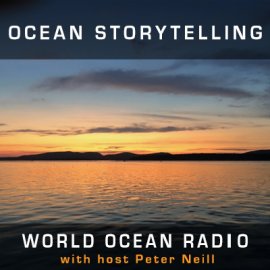Ocean Storytelling
-
English
-
ListenPause
[intro music]
I’m Peter Neill, Director of the World Ocean Observatory.
What makes a good story? There are laws of narrative, and you break them at your risk. Stories thrive in place, in sound, in emotional feeling and response. They are also without limit… “It was a dark and stormy night,” and that phrase could introduce a tale from anywhere, anytime. I can remember a teacher who enabled me, “Don’t write the assignment,” he said, “tell me a story.” The power there demands a certain responsibility: you can change a mind, inspire a nightmare, invoke a love, drive a hate, provoke a self-realization, start a war, set an idea free. Storytelling is not to be undertaken lightly.
There is a threat to storytelling abroad. The phrase has been taken up into the working jargon of our time: coopted by advertising agencies and fund-raisers. Make the sale, tell ‘em a good story; it drives me crazy.
The ocean begets stories the way it births winds and waves and connections. Stories of adventure at sea, sailors’ songs, accounts of battle, of encounter with people from another distant place, or plants and animals discovered, described, and captured in watercolor as ephemeral illustration of unimaginable things. Read the Captain’s log, the love letters home, pages stained with tears, spray, smudged corrections, and the stamped images of captured whales. Stories are frames, experienced in gilded bindings, epiphanies and metaphors like glinting shards of insight and meaning. We read stories to put our babies to sleep. We turn our children into pirates. We entertain (or bore) our friends with endless anecdote of the most strident wind encountered or the evanescent fish that got away. Every time I am at or on the ocean, I hear voices, my own, and others’, who are telling stories like those hypno-mermaids enticing sailors from their proper course. What are they saying? Are these lost memories made real but unattributed? Who are these people, and why don’t they just come out and say it?
If you listen to the ocean, you will take up the rhythm of a narrative; the sound of surprising melody in the background -- and then the smells of sale and seaweed that is all scent conjoined, the feel of fear or exultation on your skin, the combination and invasion of the senses that all good stories inspire. What a great feeling to live in a great story!
I once wrote a pre-emptive fable, about a wise man who sat on the beach every day confronting the ocean, and the stories he told first only to himself and then to disciples and others who flocked to hear his wisdom. One day, for no apparent reason, he stopped, just stopped, the telling. There was shock abroad. There was silence, then confusion, then dismay, as so many of his dependent listeners became lost in the absence of narrative as instruction. The press took notice, but not for long, and quickly the crowds abated and the man was left alone, silent, staring out to sea. One day, a group of children came running down the beach, terrorizing the plovers, leaping thought the surf. They found the man just sitting there, like gnarled driftwood, petrified and mute. They encircled him, first mocked him, but then studied him, then discussed what to do. They lifted him up from his seat in the sand, and turned him three times around, and then sat him down again, cross-legged, in his same place with its same view, and then, all at once, he began again the stories – his lively tales of sea creatures, stowaways, ragged men lost on those islands with a single palm and no rescue on the horizon. The children were delighted; the danced away as children do and left the man to his tall tales and endless chapters.
Is there a moral to be told? Yes. The ocean enables infinite perception, in all directions, through all weathers, an endless scape of human history and potential, the past and present, there in a turning horizon of human ideas and endeavors. The ocean contains the story of civilization. And each of us is that wise man, whose perspective can shift as re-invention, as a refreshed orientation and engagement with a future newly imagined, and then realized, through the oceanic fecundity and creativity and telling of our human story.
We will discuss these things, and more, in future editions of World Ocean Radio
WORLD OCEAN RADIO IS DISTRIBUTED BY THE PUBLIC RADIO EXCHANGE AND THE PACIFICA NETWORK, FOR USE BY COLLEGE AND COMMUNITY RADIO STATIONS WORLDWIDE. FIND US WHEREVER YOU LISTEN TO PODCASTS, AND AT WORLD OCEAN OBSERVATORY DOT ORG, WHERE THE FULL CATALOG OF NEARLY 700 RADIO EPISODES IS SEARCHABLE BY THEME.
[outro music]
This week on World Ocean Radio host Peter Neill talks about the power of storytelling and the vast catalog of tales of adventure, sailors, song, battle, Captain's logs, letters home, and more that tell the stories of our ocean culture and civilization.
About World Ocean Radio
Peter Neill, Director of the World Ocean Observatory and host of World Ocean Radio, provides coverage of a broad spectrum of ocean issues from science and education to advocacy and exemplary projects. World Ocean Radio, a project of the World Ocean Observatory, is a weekly series of five-minute audio essays available for syndicated use at no cost by college and community radio stations worldwide.
- Login to post comments



